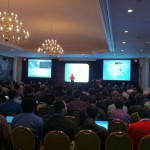 “Today is a very exciting day for GENI,” Chip Elliott, Director of the GENI Project Office (GPO), said as he kicked off the 9th GENI Engineering Conference this morning in Washington, DC. Before a hotel ballroom packed with research faculty, students, and Federal agency representatives, the nation’s best young researchers in networking and distributed systems showed off the first-ever set of research experiments on GENI, illustrating the future of network science and engineering — and what it means for our society at large. The set of live demos — with participants from around the country — were simply incredible.
“Today is a very exciting day for GENI,” Chip Elliott, Director of the GENI Project Office (GPO), said as he kicked off the 9th GENI Engineering Conference this morning in Washington, DC. Before a hotel ballroom packed with research faculty, students, and Federal agency representatives, the nation’s best young researchers in networking and distributed systems showed off the first-ever set of research experiments on GENI, illustrating the future of network science and engineering — and what it means for our society at large. The set of live demos — with participants from around the country — were simply incredible.
As background, the Global Environment for Network Innovation (GENI) Project was established by the National Science Foundation in 2007. At the time, leading networking researchers were concerned about the future of the Internet; it was becoming increasingly difficult to innovate within the “production” network. They instead envisioned a virtual laboratory for exploring future internets “at scale,” one that could open up new and exciting areas of research at the frontiers of network science and engineering – all the while having significant socio-economic impact.
As Cora Marrett, NSF’s Deputy Director, emphasized at the outset of this morning’s demonstration session, “The sorts of activities that [the GENI community is] undertaking are critical for the fortunes of the nation. As you know, NSF invests in fundamental … work in science and engineering. Some people may think of that as being so esoteric that it has no connection to the kinds of issues on our national agenda. [But] here is an activity illustrative of the kinds of collaborations — the kinds of questions — that will link fundamental questions to the prevailing issues and concerns — not just now, but well into the future.”
Through intense collaborations spanning numerous academic and industrial research labs coordinated by a partnership between NSF and the GPO, the GENI dream is becoming reality. At this morning’s session, 9 teams — comprising 20 groups, 15 campuses, two national backbones (Internet2 and National LambdaRail), and 11 regional networks) — demonstrated on-the-fly how GENI is enabling incredible, forward-looking experimentation: http://groups.geni.net/geni/wiki/Gec9PlenaryDemoAbstracts. The experiments included improvements in packet-caching for streaming large volumes of data and information in real time over large, distributed networks; enabling fast, seamless handoff between WiFi and WiMAX networks, allowing us to capitalize on the ubiquitous, abundant wireless access points; and studying experimental networks of small controllable weather radars to yield early-detection weather warning systems that improve on current government NEXRAD systems and facilitate “nowcasting.” I encourage you to learn more about all the terrific experiments demoed this morning.
This morning’s meso-scale demonstrations showcased the features of GENI, including deep programmability; a distributed, virtualized infrastructure; and interoperable, federated, and heterogeneous resources. They also illustrated a pair of GENI “firsts”: the first successful experimental “peering” (i.e., involvement of experimental applications and experimenters) between the nation’s two experimental network backbones (National LambdaRail and Internet2) in Atlanta, GA; and the first successful experimenter access to diverse GENI resources with a single interface and GENI certificate (i.e., using the GENI API and GENI certificates to provide a unified, interoperable interface to these infrastructures).
As significant as today’s milestone is, it is just the beginning in this effort to understand questions of science, innovation, and society. The GPO is thinking ahead to “at-scale” GENI, with perhaps 100 to 200 GENI-enabled U.S. campuses (academia as well as national labs), and eventually a smooth transition from, for example, a very interesting experiment to something that engages large numbers of non-technical users — over top of the existing Internet.
(Posted by Erwin Gianchandani, CCC Director)










Trackbacks /
Pingbacks